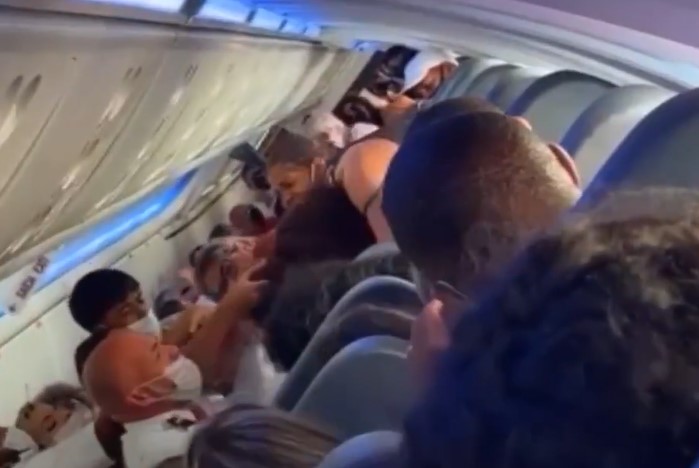Confusions such as the Gol flight that, even before departing Salvador heading to São Paulo on Thursday (2), ended in physical aggression, removal of 15 passengers from the plane, and an hour delay in arriving at Congonhas, are more common than you think: more than one case, on average, happens every day in Brazil.
The conclusion is from an Abear (Brazilian Airline Association) survey released on Monday (6), which took into account incidents with unruly passengers recorded between 2019 and 2022.
Only last year, there were 585 occurrences, a record for the last four years.

In 2019, before the pandemic, this number was significantly lower: 304 incidents.
In 2020, cases – as well as flights – decreased greatly, and 222 incidents were recorded.
In 2021, the number grew again, surpassing the pre-pandemic period with 434 incidents.
On average, over the four-year period, there were 386.2 records per year, i.e., a little more than one per day.
Last year, 9% of all cases involved mild or violent physical assaults (a 2% increase over 2021). 36% of the assaults happened during the flight, and 64% were still on the ground, as was the case with Gol.
Of the violent cases in the last four years, 42% happened on the ground, 32% in the aircraft – before takeoff or landing – and 26% during the flight.
“These data highlight a problem that has been worrying airlines, aeronautical authorities, and airports worldwide because the cases have been growing alarmingly and generate negative impacts on the whole air transport chain”, explains the president of Abear, Eduardo Sanovicz.
This is because, according to Sanovicz, a fight or disorder during just one flight generates a “domino effect”, which not only affects the passengers on that flight but delays the following ones, impacts air traffic, and the management of pilots and flight attendants in serving the public.
ASSAULTS AND THREATS ARE ON THE RISE
The association’s study further analyzes and classifies the severity of passenger behavior into three levels:
- Category 1: affects security, hygiene, or good order in the check-in and boarding processes or generates minor disturbances on board the aircraft, which a company employee or crew member can quickly control. There is no intervention by law enforcement. This type of behavior accounted for 28% of cases in 2021 and 39% in 2022.
- Category 2: affects safety, hygiene or good order in check-in and boarding processes; their attitude is challenging. Requires airport supervisor or security support to restrain this passenger. In the aircraft, he/she does not comply with instructions given by the crew. This type of behavior accounted for 59% of the cases in 2021 and 43% in 2022.
- Category 3: considerably affects other passengers’ safety, hygiene, or good order. Their aggressive and violent behavior, including physical aggression and/or threats. This type of behavior accounted for 13% of cases in 2021 and 18% in 2022.
The figures show the growth in cases of minor upsets and also in cases of violence and threats, while category 2 incidents – where the passenger does not heed instructions from the crew – fell between 2021 and 2022.
AIRLINES DEFEND PUNISHMENTS
Abear, which currently represents Abaeté, Boeing, Gol, Gollog, Latam, Latam Cargo, Rima, Sideral, and Voepass in Brazil, also revealed that it participates in a working group of Anac (National Civil Aviation Agency) and has defended with the Federal Government the definition of “clear rules for the management of cases, including more severe punishments”.
Among the alternatives suggested by the association are fines, compensation for damages, and, in more serious cases, a ban on flying.
“As has been done in the rest of the world, it is vital to have a regulation that includes the cases on the ground and punishes the most serious cases. We are collaborating with Anac in this sense, presenting all the data and facts from the last few years,” reports Sanovicz.
Cases of in-flight indiscipline grew during the pandemic around the world.
European and American airlines like Delta, American Airlines, United Airlines, and Southwest have their own lists of passengers banned from flying.
Since 2021, the US regulatory agency, Federal Aviation Administration (FAA), has had a ‘zero tolerance’ policy and imposes fines of up to US$37,000 on unruly passengers, as well as referring criminal investigations to the FBI (Federal Bureau of Investigation, the US federal police).
With information from UOL

